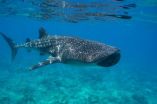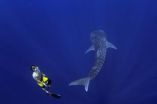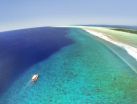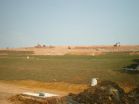(Press-News.org) They are the largest fish in the world but the impact of this majestic and charismatic animal on the economy of the island nation of the Maldives was largely unknown. A new study by scientists of the Maldives Whale Shark Research Programme (MWSRP) reveals that a small group of whale sharks in a single Maldivian Atoll accounts for nearly 3% of the global shark ecotourism and nearly half that of the Maldives'.
"The Republic of Maldives hosts one of few known year round aggregation sites for whale sharks", said James Hancock co-author and a director of MWSRP. "We have seen that they have become a major tourism draw to South Ari atoll, but we didn't expect these big numbers". The South Ari atoll Marine Protected Area (S.A.MPA) alone attracted 77,000 tourists in 2013. This equates to $9.4million USD in direct income to operators who offer the chance to glimpse this famous 'bucket list' animal.
This is the first value that has been attributed to what is a burgeoning industry in the Maldives. It is also the first time that a valuation for a wildlife viewing experience has been calculated exclusively from observational studies. "Instead of surveying tourists and extrapolating results we actually went out and counted how many boats and people were in the water looking for sharks" said Neal Collins, a joint researcher from IUCN and MWSRP and one of the authors of the study. "By doing so we were able to estimate not only how many people were interacting with the sharks, but also where and how they do it" added co-author Fernando Cagua.
"When we include the whale sharks from South Ari Atoll, we were able to adjust previous estimates of annual 'shark related' tourism expenditure in the Maldives from $12 million USD to nearly $20 million" said Fernando. "There are still many mysteries about these whale sharks - we don't know why they come here or for how long they stay - but bringing the money issue to the table is an important step towards ensuring their conservation."
Despite the South Ari Atoll Marine Protected Area (S.A.MPA) being the most popular whale shark viewing region in the Maldives, this area is as yet unregulated. This study, published today in the peer-reviewed journal PeerJ, highlights how the implementation of a management plan which safeguards this aggregation site would reduce the possible economic impact that would result from the sharks leaving the area due to stresses from the attention they receive.
The S.A.MPA was first designated in 2009. At 42 square kilometers it is the largest protected area in the Maldives. An accepted management plan was not reached at the original time of designation. Therefore, this study has proven timely, as consultations with local communities and tourism industry representatives have again begun, with a more determined effort to create a world class whale shark tourism destination.
"In a sense the whale sharks here are perfect for wildlife tourism. They are the largest shark in the world and the slow moving, shallow swimming behaviour they exhibit in S.A.MPA waters makes them accessible not just to scuba divers but also to snorkel excursions. This opens up an incredible wildlife experience to just about everyone, which of course brings with it a degree of risk in terms of the welfare of both the sharks and the tourists" said Richard Rees, director of MWSRP. "The encouraging thing is that everyone in the industry we talk to agrees these risks need to be managed and the local communities are receptive to participating in the management of the area." he added.
INFORMATION:
Link to the Published Version of the article (quote this link in your story – the link will ONLY work after the embargo lifts): https://peerj.com/articles/515 - your readers will be able to freely access this article at this URL.
Citation to the article: Cagua et al. (2014), Whale shark economics: a valuation of wildlife tourism in South Ari Atoll, Maldives. PeerJ 2:e515; DOI 10.7717/PeerJ.515
About
'Whale shark economics: a valuation of wildlife tourism in South Ari Atoll, Maldives' was written by researchers from the Maldives Whale Shark Research Programme and Red Sea Research Center, King Abdullah University of Science and Technology with the support of technical partner IUCN Maldives Program, with funding from Global Blue and USAID. Researchers from the Maldives Marine Research Center and Hubbs Sea-World Research Institute also contributed to the study in an advisory capacity.
The Maldives Whale Shark Research Programme is a registered charity (UK:1130369 and Maldives:T/2013/07/03) that exists to conduct whale shark research and foster community focused conservation initiatives in the Maldives and the throughout the Indian Ocean. For more information see http://www.mwsrp.org.
About PeerJ
PeerJ is an Open Access publisher of peer reviewed articles, which offers researchers a lifetime publication plan, for a single low price, providing them with the ability to openly publish all future articles for free. PeerJ is based in San Francisco, CA and London, UK and can be accessed at https://peerj.com/. PeerJ's mission is to help the world efficiently publish its knowledge.
All works published in PeerJ are Open Access and published using a Creative Commons license (CC-BY 4.0). Everything is immediately available—to read, download, redistribute, include in databases and otherwise use—without cost to anyone, anywhere, subject only to the condition that the original authors and source are properly attributed.
PeerJ has an Editorial Board of almost 900 respected academics, including 5 Nobel Laureates. PeerJ was the recipient of the 2013 ALPSP Award for Publishing Innovation.
PeerJ Media Resources (including logos) can be found at: https://peerj.com/about/press/
Media Contacts
Note: If you would like to join the PeerJ Press Release list, visit: http://bit.ly/PressList
For the authors: Richard Rees, Managing Director, MWSRP richard@maldiveswhalesharkresearch.org
For PeerJ: email: press@peerj.com , https://peerj.com/about/press/
Abstract (from the article):
Whale sharks attract large numbers of tourists, divers and snorkelers each year to South Ari Atoll in the Republic of Maldives. Yet without information regarding the use and economic extent of the attraction, it is difficult to prioritize conservation or implement effective management plans. We used empirical recreational data and generalized mixed statistical models to conduct the first economic valuation (with direct spend as the primary proxy) of whale shark tourism in Maldives. We estimated that direct expenditures for whale shark focused tourism in the South Ari Marine Protected Area for 2012 and 2013 accounted for US$7.6 and $9.4 million respectively. These expenditures are based on an estimate of 72,000–78,000 tourists who are involved in whale shark excursions annually. That substantial amount of income to resort owners and operators, and tourism businesses in a relatively small area highlights the need to implement regulations and management that safeguard the sustainability of the industry through ensuring guest satisfaction and whale shark conservation.
The Maldives and the whale shark: The world's biggest fish adds value to paradise
Three percent of global shark wildlife tourism money is spent viewing whale sharks in the Maldives
2014-08-12
ELSE PRESS RELEASES FROM THIS DATE:
Is empathy in humans and apes actually different?
2014-08-12
Whether or not humans are the only empathic beings is still under debate. In a new study, researchers directly compared the 'yawn contagion' effect between humans and bonobos (our closest evolutionary cousins). By doing so they were able to directly compare the empathic abilities of ourselves with another species, and found that a close relationship between individuals is more important to their empathic response than the fact that individuals might be from the same species.
The ability to experience others' emotions is hard to quantify in any species, and, as a result, ...
Sniffing out billions in US currency smuggled across the border to Mexico
2014-08-12
SAN FRANCISCO, Aug. 12, 2014 — Criminals are smuggling an estimated $30 billion in U.S. currency into Mexico each year from the United States, but help could be on the way for border guards, researchers will report here today. The answer to the problem: a portable device that identifies specific vapors given off by U.S. paper money.
They will present the new research at the 248th National Meeting & Exposition of the American Chemical Society (ACS), the world's largest scientific society. The meeting features nearly 12,000 reports on new advances in science and other ...
Could hemp nanosheets topple graphene for making the ideal supercapacitor?
2014-08-12
SAN FRANCISCO, Aug. 12, 2014 — As hemp makes a comeback in the U.S. after a decades-long ban on its cultivation, scientists are reporting that fibers from the plant can pack as much energy and power as graphene, long-touted as the model material for supercapacitors. They're presenting their
research, which a Canadian start-up company is working on scaling up, at the 248th National Meeting & Exposition of the American Chemical Society (ACS), the world's largest scientific society.
The meeting features nearly 12,000 presentations on a wide range of science topics and ...
Stinky gases emanating from landfills could transform into clean energy
2014-08-12
SAN FRANCISCO — A new technique that transforms stinky, air-polluting landfill gas could produce the sweet smell of success as it leads to development of a fuel cell generating clean electricity for homes, offices and hospitals, researchers say. The advance would convert methane gas into hydrogen, an efficient, clean form of energy.
The researcher's report is part of the 248th National Meeting of the American Chemical Society (ACS), the world's largest scientific society.
The meeting, attended by thousands of scientists, features nearly 12,000 reports on new advances ...
Climate change, predators, and the trickle down effects on ecosystems
2014-08-12
Predators play important roles in maintaining diverse and stable ecosystems. Climate change can push species to move in order to stay in their climatic comfort zones, potentially altering where species live and how they interact, which could fundamentally transform current ecosystems.
A symposium focusing on climate's effects on predators—causing cascading effects on whole ecosystems -- will take place on Tuesday, August 12th during the Ecological Society of America's 99th Annual Meeting, held this year in Sacramento, California.
There will be "winners" and "losers" ...
Blacks, women face greater burden from CVD risk factors
2014-08-11
The impact of major cardiovascular risk factors combined is greater in women than men and in blacks than whites. While the gender gap may be narrowing, differences by race may be increasing, according to new research in the American Heart Association journal Circulation.
"We've been targeting traditional risk factors in public health campaigns for many years," said Susan Cheng, M.D., M.P.H., study lead author and Assistant Professor of Medicine at Brigham and Women's Hospital in Boston, Mass. "We wanted to take a look at how well we've been doing over time at keeping ...
Bone drugs may not protect osteoporotic women from breast cancer
2014-08-11
Osteoporosis drugs known as bisphosphonates may not protect women from breast cancer as had been thought, according to a new study led by researchers at UC San Francisco (UCSF).
The drugs' protective effect was widely assumed after several observational studies showed that women who took them were less likely to get breast cancer.
But when researchers assessed the effect of two of the most widely used osteoporosis drugs – sold under the brand names, Fosamax and Reclast – in two large randomized clinical trials, neither drug protected women with osteoporosis from getting ...
Novel study maps infant brain growth in first 3 months of life using MRI technology
2014-08-11
A recent study conducted by researchers at the University of California, San Diego School of Medicine and the University of Hawaii demonstrates a new approach to measuring early brain development of infants, resulting in more accurate whole brain growth charts and providing the first estimates for growth trajectories of subcortical areas during the first three months after birth. Assessing the size, asymmetry and rate of growth of different brain regions could be key in detecting and treating the earliest signs of neurodevelopmental disorders, such as autism or perinatal ...
Gloves after hand washing associated with fewer infections in preterm babies
2014-08-11
Extremely premature babies in a neonatal intensive care unit (NICU) had fewer infections when medical staff wore gloves after washing their hands compared with hand washing alone.
The author is David A. Kaufman, M.D., of the University of Virginia School of Medicine, Charlottesville, and colleagues.
Late-onset infections (more than 72 hours after birth) and necrotizing enterocolitis (NEC, tissue death in the intestines) can cause death and neurodevelopmental impairment in extremely premature babies. Even after hand washing, medical staff can still have microorganisms ...
Normal cognition in patient without apolipoprotein E, risk factor for Alzheimer's
2014-08-11
A 40-year-old California man exhibits normal cognitive function although he has no apolipoprotein E (apoE), which is believed to be important for brain function but a mutation of which is also a known risk factor for Alzheimer disease (AD). Researchers suggest this could mean that therapies to reduce apoE in the central nervous system may one day help treat neurodegenerative disorders such as AD.
The study was authored by Angel C. Y. Mak, Ph.D., of the University of California, San Francisco, and colleagues.
The patient was referred to UCSF with severe high cholesterol ...
LAST 30 PRESS RELEASES:
Fecal transplants from older mice significantly improve ovarian function and fertility in younger mice
Delight for diastereomer production: A novel strategy for organic chemistry
Permafrost is key to carbon storage. That makes northern wildfires even more dangerous
Hairdressers could be a secret weapon in tackling climate change, new research finds
Genetic risk for mental illness is far less disorder-specific than clinicians have assumed, massive Swedish study reveals
A therapeutic target that would curb the spread of coronaviruses has been identified
Modern twist on wildfire management methods found also to have a bonus feature that protects water supplies
AI enables defect-aware prediction of metal 3D-printed part quality
Miniscule fossil discovery reveals fresh clues into the evolution of the earliest-known relative of all primates
World Water Day 2026: Applied Microbiology International to hold Gender Equality and Water webinar
The unprecedented transformation in energy: The Third Energy Revolution toward carbon neutrality
Building on the far side: AI analysis suggests sturdier foundation for future lunar bases
Far-field superresolution imaging via k-space superoscillation
10 Years, 70% shift: Wastewater upgrades quietly transform river microbiomes
Why does chronic back pain make everyday sounds feel harsher? Brain imaging study points to a treatable cause
Video messaging effectiveness depends on quality of streaming experience, research shows
Introducing the “bloom” cycle, or why plants are not stupid
The Lancet Oncology: Breast cancer remains the most common cancer among women worldwide, with annual cases expected to reach over 3.5 million by 2050
Improve education and transitional support for autistic people to prevent death by suicide, say experts
GLP-1 drugs like Ozempic could cut risk of major heart complications after heart attack, study finds
Study finds Earth may have twice as many vertebrate species as previously thought
NYU Langone orthopedic surgeons present latest clinical findings and research at AAOS 2026
New journal highlights how artificial intelligence can help solve global environmental crises
Study identifies three diverging global AI pathways shaping the future of technology and governance
Machine learning advances non targeted detection of environmental pollutants
ACP advises all adults 75 or older get a protein subunit RSV vaccine
New study finds earliest evidence of big land predators hunting plant-eaters
Newer groundwater associated with higher risk of Parkinson’s disease
New study identifies growth hormone receptor as possible target to improve lung cancer treatment
Routine helps children adjust to school, but harsh parenting may undo benefits
[Press-News.org] The Maldives and the whale shark: The world's biggest fish adds value to paradiseThree percent of global shark wildlife tourism money is spent viewing whale sharks in the Maldives




